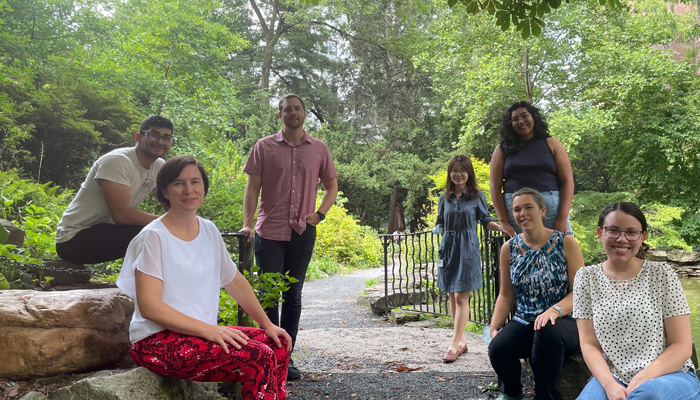HOW CAN WE HELP YOU? Call 1-800-TRY-CHOP
In This Section
Faculty Spotlight: Naiara Akizu Lopez, PhD, Merges Research Passions

Naiara Akizu Lopez, PhD, and her lab members study the genetic and epigenetic mechanisms of neurologic disorders in children.
Editor’s Note: Welcome to our monthly Faculty Spotlight series, in which we sit down with faculty members at Children’s Hospital of Philadelphia Research Institute to learn more about their research and roles. Through these spotlights, our readers meet the diverse, dedicated, and distinctive individuals who lead our research community in our mission to improve children’s health. This year, we will be asking our featured scientists about mentorship — why it matters and how it has influenced their careers. In this Q&A, we feature scientist Naiara Akizu Lopez, PhD, in the Department of Pathology and Laboratory Medicine. Stay tuned for more from our Faculty Spotlight series throughout this year!
How long have you been at CHOP? Tell us a little about your research specialty.
Since January 2017… time flies! My lab studies the genetic and epigenetic mechanisms of neurologic disorders in children. These disorders are commonly caused by altered neural development, but sometimes they overlap with degeneration of specific brain regions or neural cell types. With our research, we are trying to understand how specific genes and their regulation determine the fate of specific neural cells during brain development and degeneration.
Why did you choose to focus on that specialty?
It was just a natural process of merging my passions. I grew up in the era of the Human Genome Project (the first results were published when I was in college), and this determined my interest for genetic research. I had a college professor who conveyed to me his passion for neural development, and I was fortunate to find, for my PhD, a laboratory that combined my two passions: neural development and genetics. More precisely, I focused on epigenetics, which at the time was starting to emerge as the next step toward understanding the human genome and its regulation.
With this background, I decided to apply what I learned during my PhD to human neurodevelopmental disorders, some of which happened to show neurodegeneration of some parts of the brain. That led to my current research focus.
Can you describe a current or recent research project (or projects) that you are excited about?
I cannot choose one research project; I am excited about all of them! I fight every day to keep my focus on one at a time. A new project in collaboration with the lab of Ophir Shalem, PhD, combines a novel technology, such as in vivo CRISPR screening coupled with optical detection, with the search for genetic modifiers of Purkinje cells (a type of cerebellar cell) that will inform us about genetic vulnerabilities of Purkinje cells and potential treatments to prevent the neurodegenerative process.
What are the long-term research questions you hope to answer?
Most brain disorders are caused by defects in specific population(s) of neural cells while others remain intact. What makes some cells vulnerable and others resistant? Answering this question is not as straightforward as it seems because it probably depends on multiple factors that are specific to each particular disorder (or group of disorders). But if we can resolve at least part of the mystery, we may uncover how to make sick cells resistant to prevent or reverse the course of the neurologic disorder.
How has mentorship influenced your career?
Mentoring is an essential part of our work at every stage because most of what we do is not taught in college, but we learn from our mentors. I say mentors, in plural, because I think it is important to have multiple mentors who convey to us different experiences. There is not a single way to do an experiment, write a manuscript, or design a project and a whole research program/strategy. Learning from all these experiences that others have had facilitates the development of a diverse community of scientists.
I have multiple mentors who are the foundation of my career as a scientist. If I were to mention one, that would probably be my PhD supervisor. In addition to all the science I learned from her, she is the one who showed to me how to navigate this world being a woman who is passionate about science at maximum level while enjoying her kids, family, and personal life.